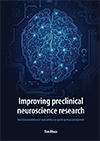PhD defence Tim Ahuis
Tim Ahuis (Neurobiology)
Promotores: Prof. M.J.H. Kas, Prof. R.S. Etienne; copromotor: Dr J. Nicholson (Boehringer Ingelheim, Germany)

Improving preclinical neuroscience research
How translatability and replicability can speed up drug development
In recent years, there has been increasing attention to the issue of limited replicability in scientific research. Replicability means that an experiment can be repeated under the same conditions with the same results. This is crucial for ensuring the reliability of scientific evidence. When replicability is low, it takes longer to confirm discoveries, and resources are used inefficiently. Although not all scientists acknowledge the existence of this "replication crisis," there are financial and ethical concerns, especially in biomedical research, as this delays the development of new treatments for patients and increases the use of animal testing. There are several causes for limited replicability, such as unclear reporting, publication bias, and suboptimal study designs. Another important aspect is translation, which refers to the transfer of results from animal studies to humans. This is particularly challenging in the neurosciences, where the causes of disorders are often unknown, and the models used are not always representative of human diseases.
A promising technique for measuring brain activity is electroencephalography (EEG). This method is inexpensive, quick, and non-invasive, and it can be effectively applied to both animals and humans. Research has shown that EEG results correlate well with clinical findings in Alzheimer’s patients, highlighting the value of this technique. A study within the EQIPD consortium has demonstrated that harmonizing experimental factors and central data analysis can reduce variability between different laboratories. This is important for improving the comparability of studies. The thesis also investigates the use of theta-gamma phase-amplitude coupling (PAC) as a biomarker. Although expectations were not always met, there are indications that this measure could be useful for assessing cognitive functions. In summary, the thesis emphasizes the challenges in preclinical research and advocates for a cultural shift where replication studies are considered just as important as new discoveries. By employing more quantitative measurements and focusing on data quality, we can achieve better and more reliable research outcomes, leading to more efficient use of resources and fewer animal tests.
